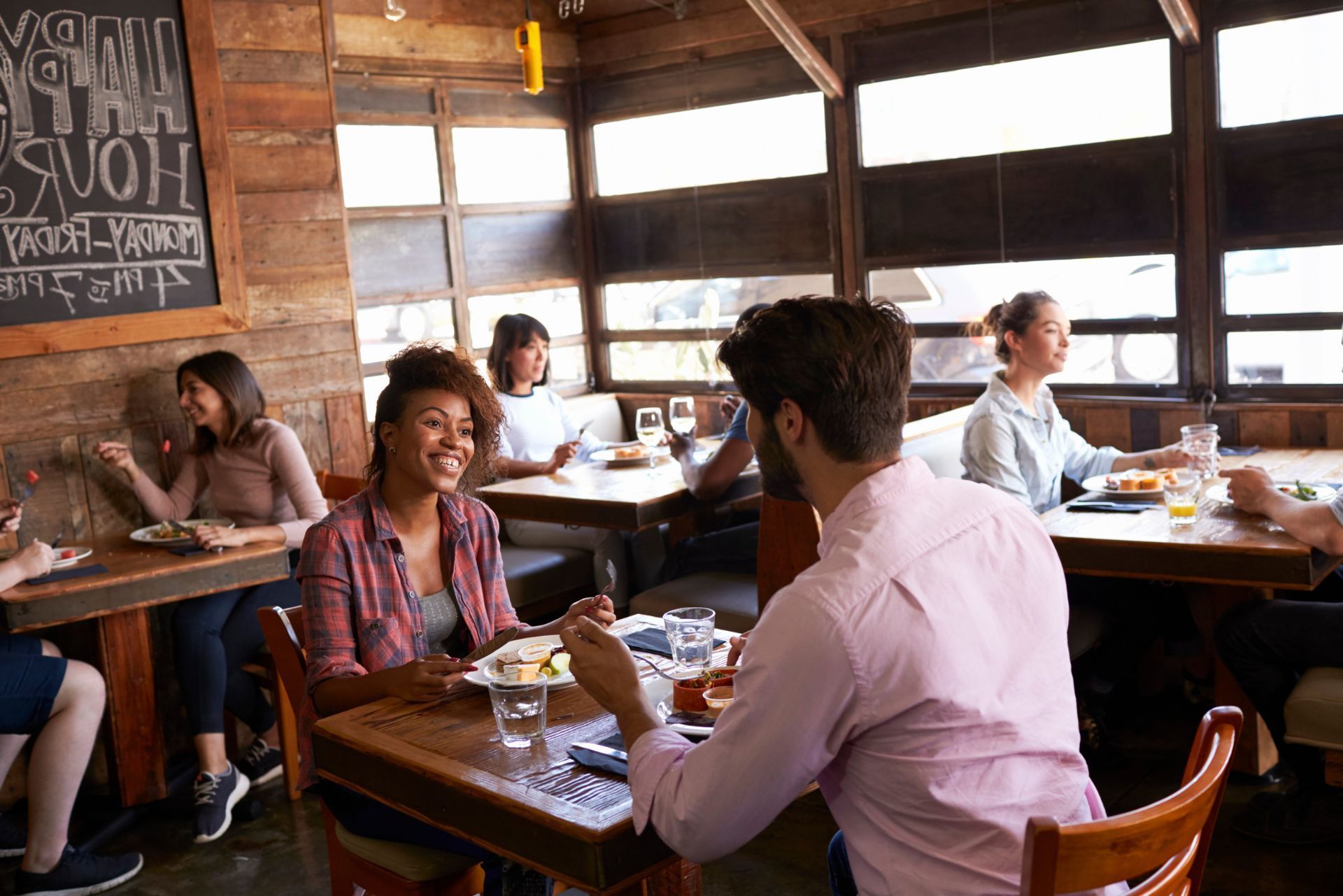Top 3 Recommended Policies

Running a restaurant in New York City is a dynamic and rewarding endeavor, but it also comes with unique challenges—especially when it comes to protecting your business. From unpredictable weather to rising operational costs, restaurant owners must navigate a complex landscape to keep their establishments safe and profitable. Understanding the nuances of restaurant insurance in New York is essential for safeguarding your investment and ensuring long-term success.
With over 23,000 restaurant establishments in NYC providing jobs to more than 300,000 people, the industry is a vital part of the city’s economy and culture. Yet, nearly 40% of restaurant owners lack adequate business insurance coverage, which poses significant risks amid increasing weather-related damages and economic pressures. This article will guide you through everything you need to know about restaurant insurance in New York, helping you make informed decisions to protect your business.
For more detailed industry insights, visit the New York City Hospitality Alliance.
Why Restaurant Insurance is Crucial in New York City
New York’s restaurant industry is a bustling ecosystem that supports a diverse workforce and a rich culinary heritage. However, this vibrancy comes with inherent risks. From property damage due to severe weather to liability claims from customers, restaurants face a variety of threats that can disrupt operations and drain finances.
According to a 2025 survey, 40% of restaurant owners reported experiencing winter weather-related property damage, though this was a slight improvement from 48% the previous year. Despite this, 38% of restaurant owners remain uncertain about the extent of coverage their insurance policies provide for weather damage. This uncertainty highlights the importance of having clear, comprehensive insurance tailored to the specific risks faced by NYC restaurants.
Moreover, 38% of restaurants reported generating no profit at all in 2024, underscoring the financial vulnerability many operators face. Without proper insurance, unexpected costs from property damage, lawsuits, or business interruptions can push struggling restaurants into closure. The competitive nature of New York's dining scene means that even a brief disruption can lead to a loss of loyal customers, further exacerbating financial strain.
Types of Insurance Every NYC Restaurant Should Consider
Understanding the types of insurance available can help restaurant owners build a robust safety net. Common policies include:
- General Liability Insurance: Protects against claims of bodily injury or property damage caused to customers or third parties.
- Property Insurance: Covers physical damage to the restaurant building and contents from fire, theft, or weather-related events.
- Business Interruption Insurance: Provides compensation for lost income if the restaurant must close temporarily due to a covered event.
- Workers’ Compensation Insurance: Required in New York, this covers medical expenses and lost wages for employees injured on the job.
- Liquor Liability Insurance: Essential for establishments serving alcohol, protecting against claims related to intoxicated patrons.
Given the high percentage of immigrant workers in NYC restaurants—over 60% as of 2018—ensuring proper workers’ compensation coverage is critical for compliance and employee protection. This demographic often faces unique challenges, including language barriers and varying levels of familiarity with workplace safety regulations. As such, restaurant owners must not only secure insurance but also invest in training and resources to create a safe working environment. Additionally, many restaurants are now exploring options for cyber liability insurance, especially as online ordering and digital payment systems become more prevalent. Protecting sensitive customer data from breaches is becoming increasingly important in an era where trust and security are paramount.

Challenges Facing NYC Restaurant Owners Regarding Insurance
Despite the clear benefits of insurance, many restaurant owners in New York City face challenges in securing and understanding adequate coverage. A recent survey found that 38% of restaurant owners felt uncertain about what their insurance policies cover regarding weather damage, a figure that rose from 26% the previous year. This lack of clarity can lead to underinsurance or gaps in protection.
Additionally, 38% of restaurant owners reported not having business insurance at all as of January 2025, up from 29% the year before. This growing uninsured segment is concerning, especially as extreme weather events become more frequent and costly.
Rising operational costs also compound these challenges. In 2024, 45% of restaurant operators said they needed to hire more employees to meet customer demand, yet 98% cited higher labor costs as a significant concern. Balancing these expenses alongside insurance premiums requires careful financial planning.
For more on the financial pressures facing NYC restaurants, see the National Restaurant Association report.
Impact of Rising Costs and Economic Uncertainty
Rising interest rates and inventory costs have been identified as major threats to the restaurant industry's near-term economic outlook. In 2024, two-thirds of respondents cited rising interest rates as the most potent economic threat, while restaurant operators frequently pointed to escalating inventory costs as their primary financial strain.
These economic pressures make the role of insurance even more critical. Without adequate coverage, restaurants risk facing devastating out-of-pocket expenses that can jeopardize their survival amid already tight margins. Furthermore, the unpredictability of the market means that restaurant owners must not only navigate their current financial landscape but also anticipate future challenges, such as potential supply chain disruptions or shifts in consumer behavior. Many are now considering alternative insurance models, such as pay-as-you-go or usage-based policies, which could offer more flexibility in managing their finances during uncertain times.
Moreover, the complexity of insurance policies can often leave owners feeling overwhelmed. Terms and conditions can be dense and filled with jargon, making it difficult for operators to fully comprehend what is covered and what is not. This lack of understanding can lead to costly mistakes, such as assuming coverage for certain types of damages that are actually excluded from their policy. To combat this, some restaurant associations are offering workshops and resources aimed at educating owners on how to navigate their insurance options effectively, ensuring that they are better equipped to make informed decisions that protect their businesses.
How to Choose the Right Insurance Policy for Your NYC Restaurant
Selecting the right insurance policy requires a thorough understanding of your restaurant’s unique risks and operational needs. Here are some key steps to guide you:
Assess Your Risks
Consider the specific hazards your restaurant faces, including location-based risks like flooding or snow damage, the nature of your menu and services, and staffing patterns. For example, restaurants with nightlife components should consider additional coverage given the city's 25,000+ nightlife establishments that contribute significantly to local tax revenue and employment. Additionally, think about the potential for slip-and-fall accidents, which are common in busy dining environments. Understanding the demographics of your clientele can also help identify specific risks; for instance, a family-oriented restaurant may face different challenges compared to a high-end establishment catering to a more affluent crowd.
Evaluate Coverage Options
Compare policies from multiple insurers to find comprehensive coverage that fits your budget. Pay special attention to exclusions and limits, especially concerning weather-related damage and liability. It's also wise to consider endorsements that can enhance your policy, such as business interruption coverage, which can protect your income in the event of a disaster that forces you to temporarily close your doors. Moreover, think about the importance of equipment breakdown coverage, particularly if your restaurant relies heavily on specialized kitchen equipment that is essential for daily operations.
Understand Legal Requirements
New York State mandates certain coverages, such as workers’ compensation. Ensure your policy meets or exceeds these requirements to avoid penalties and protect your employees. Additionally, familiarize yourself with local regulations regarding health and safety standards, as non-compliance can lead to fines and increased liability exposure. It’s also beneficial to stay updated on any changes in legislation that may affect your insurance needs, such as new labor laws or health mandates that could impact your operations.
Consult Industry Resources
Industry organizations like the
New York City Hospitality Alliance provide valuable data and guidance tailored to the local market, helping you make informed decisions. In addition to the Alliance, consider reaching out to local chambers of commerce or trade associations that focus on the restaurant sector. These organizations often host workshops and seminars that can provide insights into best practices for risk management and insurance procurement. Networking with other restaurant owners can also yield practical advice and firsthand experiences that may help you navigate the complexities of insurance in the competitive NYC landscape.
Protecting Your Business Against Weather-Related Risks
New York’s weather can be unpredictable and harsh, with winter storms and flooding posing significant threats to restaurants. In 2025, 45% of restaurant owners felt very prepared for severe weather, but a substantial portion still felt underprepared or only somewhat prepared. This gap in preparedness highlights the need for restaurant owners to take proactive steps to safeguard their establishments against the elements, particularly in a city where the weather can change in an instant.
Investing in property and business interruption insurance can mitigate the financial impact of weather-related closures or repairs. Additionally, proactive measures such as regular maintenance, emergency preparedness planning, and clear communication with your insurer can enhance your resilience. Understanding the specific risks associated with your location, such as flooding in low-lying areas or heavy snowfall in certain neighborhoods, can help tailor your insurance policies and preparedness strategies to better suit your needs.
Given that nearly 40% of restaurant owners have experienced winter weather-related property damage recently, prioritizing weather-specific coverage is a smart move for NYC restaurateurs. Furthermore, it’s essential to stay informed about local weather forecasts and alerts, as timely information can be critical in preventing damage. Establishing relationships with local emergency services and weather monitoring organizations can also provide valuable insights and support during severe weather events.
Tips for Managing Weather Risks
- Conduct seasonal risk assessments and update your insurance coverage accordingly.
- Maintain clear documentation and photographs of your property to support claims.
- Develop a business continuity plan that includes alternative service options during closures.
In addition to these strategies, consider investing in weather-resistant infrastructure. For instance, installing storm shutters, reinforcing roofs, and ensuring proper drainage can significantly reduce the risk of damage during severe weather. Moreover, training your staff on emergency protocols and safety measures can foster a culture of preparedness, ensuring that everyone knows their role when faced with a weather-related crisis. Regular drills can help keep this knowledge fresh and ensure a swift response when needed.
Lastly, engaging with your local community can also be beneficial. Building relationships with other business owners can lead to shared resources and strategies for weather preparedness. Collaborating on initiatives such as community-wide emergency response plans or joint purchasing of insurance can enhance resilience and create a support network that can be invaluable during challenging times. By taking these comprehensive steps, restaurant owners can better protect their businesses and thrive despite the unpredictable nature of New York's weather.

The Role of Insurance in Supporting NYC’s Diverse Restaurant Industry
New York City’s restaurant scene is famously diverse, representing cuisines from more than 150 countries. This diversity contributes to a vibrant cultural fabric but also means that insurance needs can vary widely depending on cuisine type, service style, and customer base.
For instance, establishments serving alcohol must consider liquor liability insurance, while those employing large immigrant workforces should prioritize workers’ compensation and employment practices liability coverage. Understanding these nuances is key to comprehensive protection.
Moreover, the restaurant industry accounts for about 1 in 12 private sector jobs and establishments citywide, highlighting its economic significance. Ensuring that restaurants are well-insured helps maintain this vital sector’s stability and growth.
In addition to the basic insurance coverages, many restaurants in NYC are also investing in specialized policies that address unique risks associated with their specific operations. For example, food spoilage insurance can be crucial for establishments that rely heavily on fresh ingredients, especially those that operate in areas prone to power outages. Similarly, cyber liability insurance is becoming increasingly relevant as more restaurants adopt digital payment systems and online ordering platforms, making them potential targets for data breaches.
Furthermore, the rising trend of outdoor dining, accelerated by the pandemic, brings its own set of insurance considerations. Restaurants expanding their seating onto sidewalks or streets may need additional coverage to protect against accidents or injuries that could occur in these public spaces. As the industry continues to evolve, staying informed about the latest insurance options and requirements is essential for restaurant owners to safeguard their businesses and ensure they can thrive in NYC’s competitive landscape.
Learn more about the industry’s economic impact at the
New York City Hospitality Alliance’s statistics page.
Conclusion: Prioritize Insurance to Secure Your Restaurant’s Future
Operating a restaurant in New York City comes with exciting opportunities and considerable risks. With increasing financial pressures, unpredictable weather, and a competitive market, having the right insurance coverage is not just a regulatory necessity but a critical business strategy.
By understanding the types of insurance available, assessing your unique risks, and staying informed about industry trends, you can protect your restaurant from unforeseen setbacks and position it for long-term success. Remember, nearly 40% of restaurant owners lack sufficient insurance, so taking proactive steps today can make all the difference tomorrow.
For more insights and resources, consider exploring detailed reports from the
New York City Hospitality Alliance and industry analyses like those from
MyNewMarkets.com.
Contact Us
Phone
Location
